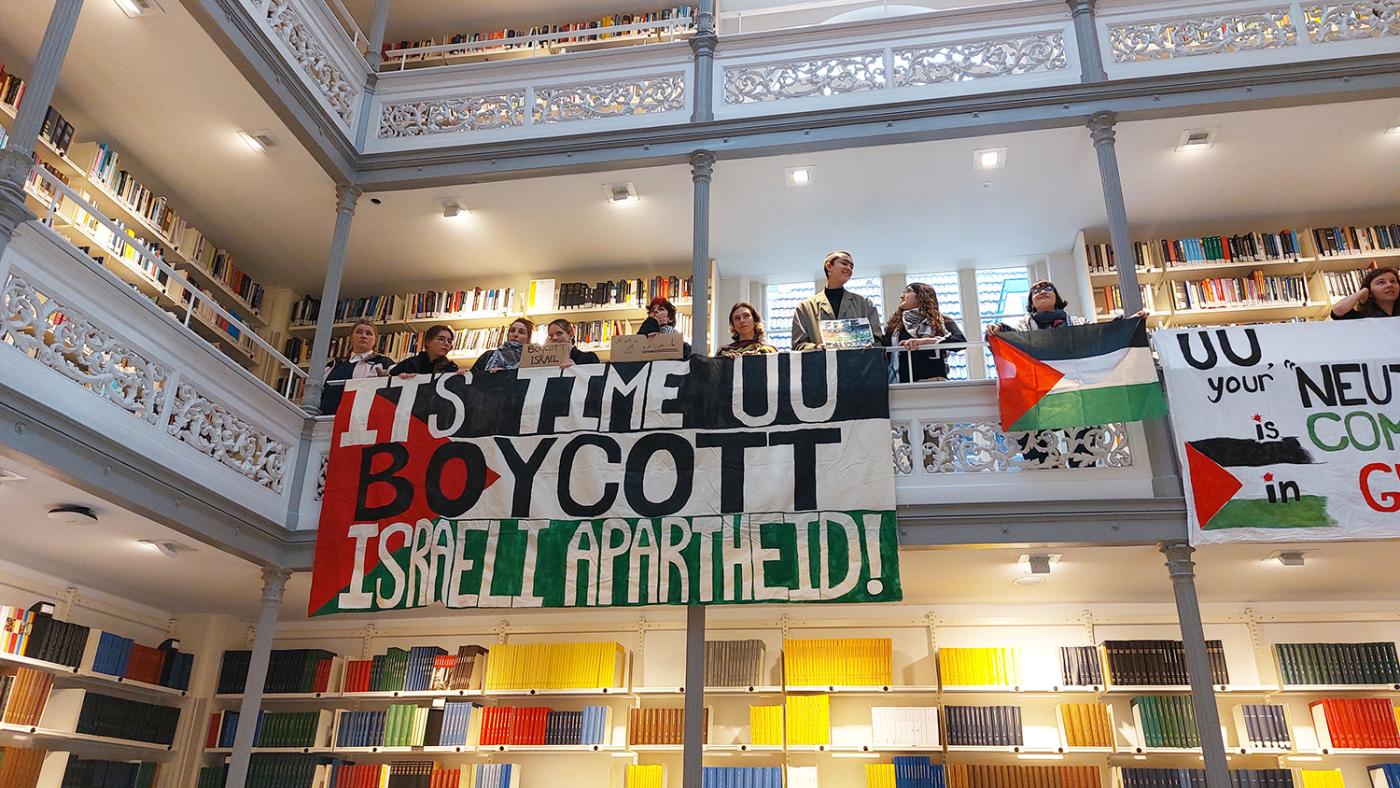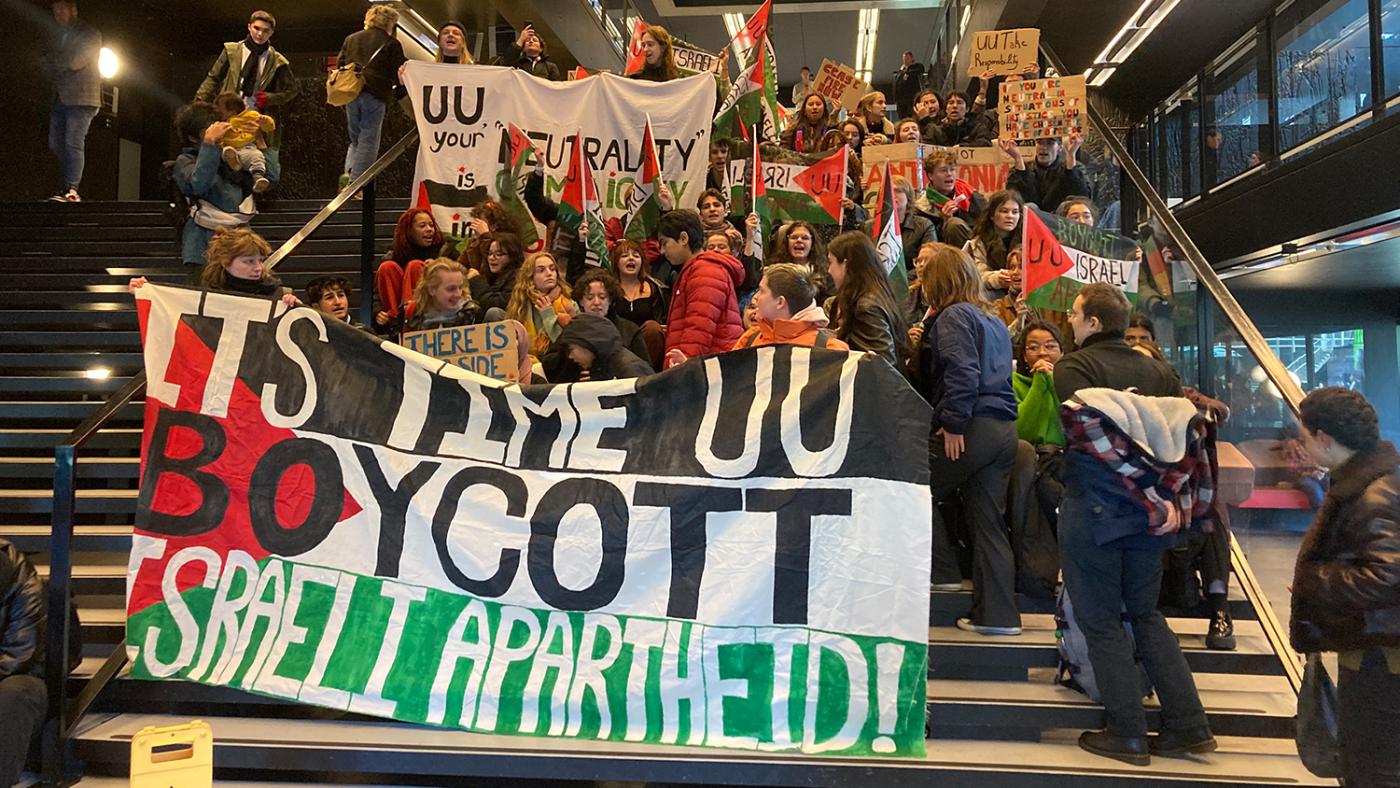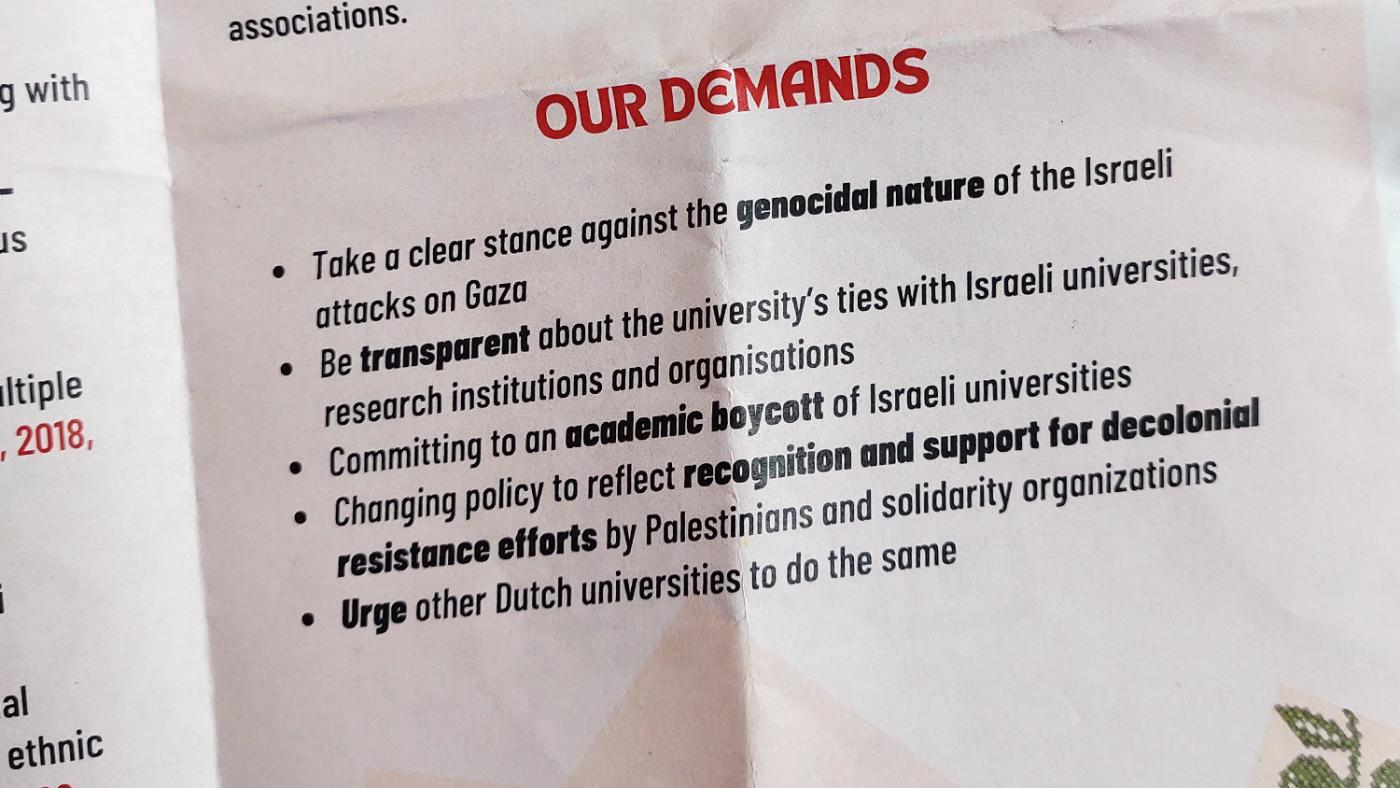Three activists striving to save human lives
‘UU isn't neutral because it has ties with universities in Israel’

UU students Yesmine, Raha and Souad joined Utrecht in Solidarity with Palestine (USP) a few months ago. They don’t want their last names to be mentioned in this article because they’re afraid of getting hate messages on social media. Law student Yesmine grew up in Tunisia and has been "speaking out for Palestine all her life." Here in the Netherlands, she continues to "express her concerns about this genocide.”
Raha explains her decision to join USP as follows: “Have you seen the news? The horror is unimaginable. I think it’s everyone’s duty to speak up when the government and the university make the wrong choices. We have the responsibility to influence people on this matter, especially when human lives are at risk.”
In addition to demonstrating together, the students also comfort each other. Raha: “The fact that you’re surrounded by students who feel and experience the same as you is a huge support.”
Weapons
USP has published both a petition and an open letter urging the Executive Board to strongly condemn the violent actions against Palestinians. They also want the university to break its ties with Israeli universities. Both were signed by more than a thousand students and teachers.
The activists find the cooperation with Israeli universities problematic because these institutions are "closely involved in the Israeli occupation and the development of weapons that are used to kill Palestinians," says Souad, a student at the Faculty of Humanities.
As an example, the activists mention Michael Federmann, Chair of Elbit Systems, the military technology company that is the most important supplier to the Israeli army. Federmann is also the honorary chair of the Executive Committee of the Hebrew University of Jerusalem. In addition, the University of Haifa is offering an elite training programme for the Israeli Defence Forces (IDF). UU works together with both universities.
Souad: “It’s impossible for the university to stay neutral when it has ties with Israeli universities. Holding on to this ‘neutrality’ makes the university complicit in the genocide of the Palestinians.”
Exchange programmes
UU has exchange programmes with the Hebrew University of Jerusalem, Reichman University in Tel Aviv, and the University of Haila. However, students can't go there anymore because the Dutch government does not advise travelling to Israel at the moment. These exchange options are temporarily unavailable.
However, UU scientists are still cooperating with Israeli universities that participate in about forty research consortia (which are usually financed by European subsidies), according to a spokesperson for UU. In addition, the university is involved in a handful of small-scale collaborations, often in the field of Life Sciences. For example, a device to cure breast infections developed by an Israeli company is currently being tested.
In mid-February, the university administration announced that the association of Dutch universities (Universities of the Netherlands or UNL) is working on a "joint framework" to address the situation in Israel and the Palestinian Territories. They are also doing this in light of the International Court of Justice's interim ruling in The Hague on alleged genocide.

Protesters organised in November a sit-in at UBU. Photo: DUB
Protests on campus
In the past few months, the protest group has held several demonstrations in the university libraries (both in the city centre and at Utrecht Science Park), as well as in front of the Administration building. A meeting of the University Council has also been disrupted by USP. None of these demonstrations have changed the stance of the Executive Board.
Some UU students find the protests carried out by USP frightening or intimidating. Some say they have felt pressured to sign a petition when a pro-Palestine protester entered the faculty building asking people to do so.
The protester in question is Raha, whose experience of the event was completely different: “Before I joined USP, I was approached by a protester myself and the conversation felt emotionally supportive. That’s why I wanted to talk to students. That day, we had a walk-out with USP. I went to the Langeveld building and climbed on one of the couches because I wanted to address everyone at once and ask them to sign the petition.”
“I held a short speech about the petition and then went around with a QR code", she continues. "I didn’t wait for people to sign it and didn’t ask them for their personal information. I told students who did not know much about the petition that they could read and sign it in their own time if they wanted to. I didn’t force anyone. Some didn’t want to sign the petition and that was okay.”

The demonstrators from USP handed out flyers with their demands
Discomfort
Raha was "surprised and confused" that some students felt pressured. "I cannot speak for them and how they experienced things. I can imagine, though, that it’s not easy to talk about genocide. We should remember that protesting can be uncomfortable and we should not confuse discomfort with threats or intimidation. Intimidation is a strong word. It’s sad to see such words being hurled into the world when, in essence, we are asking to keep people alive."
Raha regrets that the students who did not feel comfortable with her actions did not approach her at the time. "I hope they will come to us to talk about it. How can something be intimidating if someone says 'no' and then I walk away and it’s all done respectfully?" Yesmine adds: "I have never been approached by anyone from USP telling me to do something. We are open for conversation if students feel the need to talk to us or express their concerns about us. They can walk up to us. That's not a problem." The activists stress that most reactions to their protests are positive.
Dialogue
Apart from the fact that the university hasn't changed its position, Raha, Souad and Yesmine also feel that UU hasn’t done enough to support students. In the past few months, there have been meetings and teach-ins about the topic at some faculties, including Medicine, University College Utrecht, and Law. However, according to the three students, their faculties didn't organise anything.
Yesmine: “As a member of USP, we would know if something was organised within the faculty. So our faculties probably didn’t do anything for Palestine or Palestinian students.”
Commemorating victims
“But the university is capable of doing so", observes Raha. "I am Iranian and UU approached Iranian students when mass protests broke out in Iran in 2021, following the death of Mahsa Amini for wearing her headscarf 'incorrectly'. We were invited to a gathering with tea and dates to talk about the event and how it affected us. It was a safe place for students to talk about what they were going through. UU should have done the same with Arab or other affected students now, but it chose not to."
“During the national uprising in Iran, I organised an initiative in which students and employees could place their handprint on canvas to commemorate the victims,” she says. “I wanted to do something similar for the Palestinians and hang the canvas in the university library, just like I did for Iranian victims. However, the university told me that they would take it down if people felt intimidated by it. They also asked me not to use any flags and to make sure it would not be polarising. Such a response to a commemoration of innocent victims of a genocide is insensitive. It's incomprehensible that the university reacts so differently to two situations involving human rights violations.”
Executive Board
The university maintains its response concerning the protests of Utrecht in Solidarity with Palestine. "By not taking sides as an institution, Utrecht University is giving individual students and staff every opportunity to do so, based on knowledge, commitment and the exchange of points of view. By not taking a stand, the university can remain a sanctuary of knowledge, research, opinions, and views. After all, that is the essence of a university."
UU says it acts out of respect for the international rule of law and rejects the idea that it would be "complicit in genocide" by maintaining contacts with Israeli universities. "Moreover, there are colleagues and students in the universities of Israel who seek nuance in the debate about the conflict and oppose the policy implemented by the Israeli cabinet."
The board members say that they are just as horrified as anyone else when seeing the images aired daily on TV. “We often receive e-mails, letters, and petitions. Additionally, the protests show to what extent this tragic conflict understandably stirs up emotions in our community. Therefore, we are aware that this conflict is a hot topic at our university. There have been a few requests for help addressed to the faculties in the past few months. At the end of 2023, UU held meetings at the educational level because there seemed to be a need for them at some of the faculties, such as Humanities, UCU, and Medicine.”
In December and January, the Executive Board hosted several petition drafters and signatories for talks on the situation in Israel and the Palestinian Territories. "In these talks, visions and views were exchanged and an attempt was made to discuss ways in which, despite many emotions, we can ensure a safe study and working environment in our buildings. In all communications surrounding this conflict, we have also mentioned where people can go if they need to talk or access other forms of support. As mentioned above, relatively few requests for help are coming in through these channels. If students in specific faculties need a meeting, they can indicate this through those routes."